HEARING LOSS
Hearing Loss & Memory: Understanding the Connection
By Team Hearzap | April 25, 2025
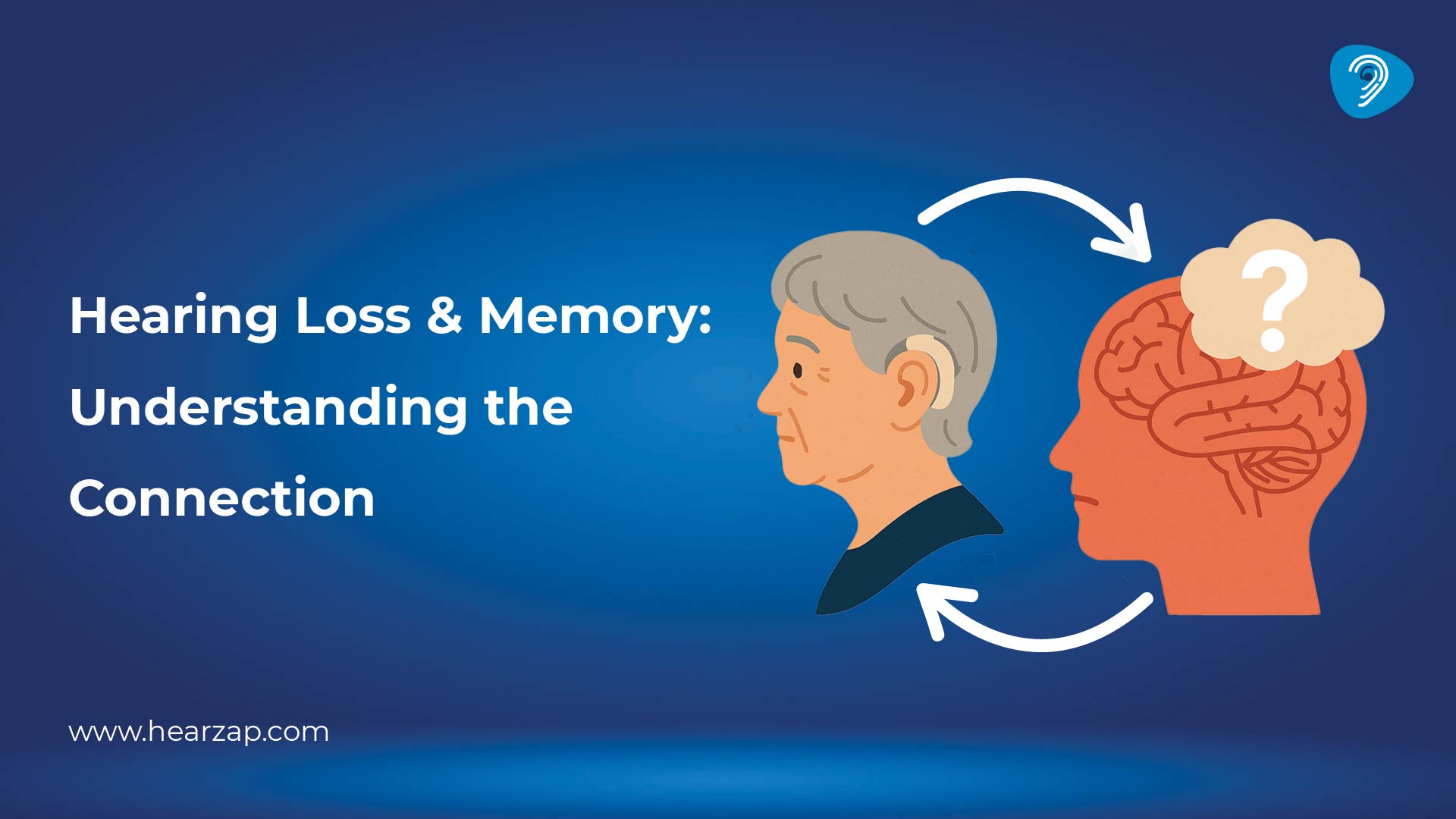
The Hidden Link Between Hearing Loss and Memory
- Hearing loss and memory decline are often viewed as separate age-related conditions.
- Emerging research highlights a strong correlation between auditory impairment and cognitive decline, particularly memory loss.
- Studies indicate that untreated hearing loss can accelerate brain atrophy.
- This can lead to forgetfulness, difficulty processing information, and an increased risk of dementia.
- Understanding this connection allows individuals to take proactive steps to protect their cognitive health.
Understanding the Impact of Hearing Loss on Cognitive Health
- Cognitive health includes memory, problem-solving abilities, and overall brain function.
- Hearing is crucial for communication, social interaction, and mental engagement.
- When hearing is impaired, the brain works harder to decipher sounds, taking resources away from memory functions.
- Increased cognitive load can lead to mental fatigue and memory impairments.
- Social isolation due to hearing loss contributes to depression and cognitive decline.
Why Memory Decline is Common Among Those with Hearing Impairment
Several factors contribute to memory loss in individuals with hearing impairment:
- Increased Cognitive Load: The brain compensates for hearing loss by allocating more resources to auditory processing. This reduces the capacity available for memory storage and recall, leading to forgetfulness and cognitive decline.
- Brain Atrophy: Research suggests that hearing impairment is linked to accelerated shrinkage of the brain, particularly in areas responsible for memory and comprehension, such as the hippocampus and auditory cortex. This deterioration contributes to an increased risk of dementia and Alzheimer’s disease.
- Social Isolation and Depression: Individuals with hearing loss often experience difficulty in conversations, leading to withdrawal from social activities. Isolation is a significant risk factor for depression, which is closely linked to cognitive decline and memory impairment.
- Reduced Auditory Stimulation: Hearing loss decreases the amount of sensory input the brain receives. The brain thrives on stimulation, and a lack of auditory input can result in neural degeneration, affecting memory retention and recall.
- Increased Risk of Dementia: Multiple studies have demonstrated a strong link between hearing loss and dementia. Researchers believe that the combination of brain atrophy, social withdrawal, and increased cognitive strain contributes to a heightened risk of developing neurodegenerative diseases.
How to Protect Cognitive Health Despite Hearing Loss
Fortunately, several proactive measures can help mitigate the impact of hearing loss on memory:
- Hearing Aids and Assistive Devices: Using hearing aids or cochlear implants can significantly improve auditory input, reducing cognitive strain and preserving brain function. Modern hearing technology is designed to enhance speech clarity and promote active listening, benefiting cognitive health.
- Regular Hearing Checkups: Routine hearing assessments can detect early signs of hearing impairment. Timely intervention with hearing devices can help prevent long-term cognitive issues associated with untreated hearing loss.
- Cognitive Training and Brain Exercises: Engaging in activities that stimulate the brain, such as puzzles, reading, and memory games, can enhance cognitive resilience. These exercises help maintain neural connections and improve memory retention.
- Social Engagement: Staying socially active can counteract the effects of hearing loss on memory. Participating in group activities, maintaining conversations, and using hearing aids to facilitate communication can prevent social isolation and cognitive decline.
- Healthy Lifestyle Choices: A balanced diet, regular exercise, and quality sleep contribute to overall brain health. Nutrients such as omega-3 fatty acids, antioxidants, and vitamins play a crucial role in cognitive function and memory preservation.
- Managing Stress and Mental Health: Chronic stress and anxiety can negatively impact memory. Practicing relaxation techniques, mindfulness, and seeking professional support for mental health concerns can improve overall cognitive well-being.
How Hearing Loss Affects Brain Function and Memory
- Hearing loss significantly impacts brain function and memory by reducing auditory input, leading to cognitive strain and neural reorganization.
- The brain relies on sound to stimulate various cognitive processes, including speech comprehension, problem-solving, and memory formation.
- When auditory signals diminish due to hearing loss, the brain compensates by reallocating cognitive resources from other areas, such as memory and concentration, to process sounds.
- This increased cognitive load can weaken memory retention and slow down cognitive processing speeds.
- Studies have shown that prolonged auditory deprivation can lead to structural changes in the brain, particularly in the hippocampus, which plays a crucial role in memory storage.
- Individuals with untreated hearing loss often experience difficulties in following conversations, recalling information, and processing complex auditory input, which contributes to cognitive fatigue.
- Over time, the extra effort required to understand speech can lead to brain exhaustion, further exacerbating memory decline
The Role of Auditory Processing in Memory Retention
- Auditory processing plays a vital role in memory retention by enabling the brain to filter, recognize, and store sounds effectively.
- When hearing is impaired, the brain struggles to differentiate between important auditory cues and background noise, making it harder to focus and retain information.
- Memory retention depends on the ability to encode and retrieve auditory information, but hearing loss disrupts this process, leading to forgetfulness and difficulty recalling past events.
- The brain processes sound by converting it into neural signals that are then stored for future reference, but when auditory input is weak or distorted, memory encoding becomes inefficient.
- Individuals with hearing loss often find it challenging to recall spoken instructions, conversations, or verbal cues, which affects their ability to learn and retain new information.
- Hearing aids and other assistive listening devices can help improve auditory processing by enhancing sound clarity, reducing cognitive effort, and supporting memory retention.
- Research suggests that improving auditory input through hearing interventions can slow down memory decline and support overall cognitive health.
Cognitive Load and the Strain on Memory in Hearing-Impaired Individuals
- Cognitive load refers to the mental effort required to process and retain information, and it significantly increases in individuals with hearing impairment.
- Hearing loss forces the brain to work harder to interpret sounds, diverting cognitive resources away from memory formation and problem-solving.
- This additional strain can lead to increased mental fatigue, making it harder for individuals to concentrate, stay engaged in conversations, or recall information accurately.
- When auditory processing is compromised, the brain compensates by using visual and contextual cues to interpret speech, further increasing cognitive effort.
- Studies indicate that individuals with hearing impairment often struggle with multitasking, as their brains are already overloaded with the task of understanding speech.
- The continuous effort to compensate for hearing loss can accelerate cognitive decline, increasing the risk of developing memory-related conditions such as dementia.
- Reducing cognitive load through hearing aids, auditory training, and active listening strategies can help alleviate strain and improve memory retention.
The Scientific Connection Between Hearing Loss and Dementia Risk
- Numerous studies have established a strong correlation between untreated hearing loss and an increased risk of dementia.
- Research conducted by Johns Hopkins University found that individuals with severe hearing loss were up to five times more likely to develop dementia compared to those with normal hearing.
- The exact mechanism behind this link is still under investigation, but scientists believe that reduced auditory input leads to brain shrinkage, particularly in regions responsible for memory and cognition.
- Hearing loss contributes to social isolation, which is a known risk factor for dementia, as reduced social engagement leads to decreased mental stimulation.
- Prolonged hearing impairment can accelerate neural atrophy, reducing the brain’s ability to process and retain information efficiently.
- Early intervention with hearing aids and other auditory support systems has been shown to slow down cognitive decline and reduce dementia risk.
- Regular hearing check-ups and proactive hearing care are essential strategies for maintaining cognitive function and protecting against memory-related disorders.
The Impact of Untreated Hearing Loss on Short-Term and Long-Term Memory
- Untreated hearing loss has a significant impact on both short-term and long-term memory, affecting an individual's ability to process, retain, and recall information.
The lack of auditory stimulation forces the brain to work harder to interpret sounds, which reduces cognitive efficiency and memory performance. - Studies show that individuals with untreated hearing impairment experience faster cognitive decline than those who use hearing aids or other auditory support devices.
- The brain requires a continuous flow of sensory input to maintain cognitive function, and hearing loss disrupts this process, leading to memory lapses and mental fatigue.
- Over time, untreated hearing loss can lead to structural changes in the brain, affecting the neural pathways responsible for memory storage and retrieval.
- People with untreated hearing loss often struggle with remembering recent conversations, instructions, or daily tasks, which can negatively impact their quality of life.
- Addressing hearing loss through proper interventions can help preserve cognitive abilities and reduce the risk of severe memory impairment
Short-Term Memory Impairment Due to Hearing Loss
- Short-term memory is responsible for temporarily storing information before it is processed into long-term memory, and hearing loss can significantly disrupt this function.
- When auditory input is unclear or missing, the brain struggles to encode and store information, leading to forgetfulness and difficulty recalling recent conversations.
- Individuals with hearing loss may frequently ask people to repeat themselves, as their brain cannot efficiently retain spoken words.
- The extra cognitive effort required to understand speech can overload the brain, making it harder to store new information in short-term memory.
- Background noise and poor auditory clarity further contribute to short-term memory struggles, as the brain must filter out distractions while attempting to process speech.
- A study by the National Institute on Aging found that even mild hearing loss can result in decreased short-term memory function as the brain reallocates resources to compensate for auditory deficits.
- Using hearing aids and assistive listening devices can improve short-term memory retention by enhancing sound clarity and reducing cognitive strain.
Long-Term Cognitive Decline: The Link Between Hearing Loss and Alzheimer's Disease
- Research has shown a strong connection between hearing loss and an increased risk of developing Alzheimer's disease and other forms of dementia.
- A study conducted by Johns Hopkins University found that individuals with untreated hearing loss were up to five times more likely to develop Alzheimer's disease than those with normal hearing.
- Hearing loss accelerates brain shrinkage, particularly in areas associated with memory and cognitive function, leading to a higher likelihood of dementia.
- The brain relies on consistent auditory stimulation to maintain neural connections, and when hearing loss occurs, these pathways weaken, contributing to cognitive decline.
- Social isolation, a common consequence of untreated hearing loss, further increases the risk of Alzheimer's disease by reducing mental engagement and cognitive activity.
- Long-term hearing impairment can lead to reduced brain plasticity, making it more difficult to form and retrieve memories over time.
- Early intervention, such as wearing hearing aids and participating in cognitive training exercises, can slow down or even prevent the onset of Alzheimer 's-related memory decline.
Studies Exploring the Relationship Between Hearing Loss and Memory
Several scientific studies have investigated the link between hearing loss and memory decline, revealing a strong correlation between auditory impairment and cognitive deterioration.
- A study by the Lancet Commission on Dementia Prevention found that hearing loss is one of the most significant modifiable risk factors for dementia, emphasizing the importance of early hearing intervention.
- Research conducted by the University of California, San Francisco, discovered that hearing-impaired individuals performed worse on memory and cognitive tests compared to those with normal hearing.
- Another study published in JAMA Neurology concluded that hearing aid users had a slower rate of cognitive decline than individuals who did not treat their hearing loss.
- Brain imaging studies have shown that people with hearing loss experience accelerated brain shrinkage, particularly in regions responsible for memory formation.
- A long-term study by the National Institute on Deafness and Other Communication Disorders (NIDCD) demonstrated that treating hearing loss can improve cognitive performance and delay memory decline.
- These findings highlight the necessity of regular hearing assessments and timely treatment to protect both auditory and cognitive health.
Can Treating Hearing Loss Improve Memory Function?
- Research confirms that treating hearing loss significantly enhances memory function and cognitive abilities.
- Hearing loss increases cognitive load, making it harder for the brain to process and store information efficiently.
- By restoring auditory input, the brain can reallocate cognitive resources toward memory retention and mental clarity.
- Several studies have found that individuals who treat their hearing loss with hearing aids or implants show improvements in attention span and recall ability.
- Untreated hearing loss contributes to mental fatigue, making it difficult to concentrate and remember details. Treatment alleviates this strain, improving cognitive performance.
- Addressing hearing impairment also enhances language processing, allowing for better comprehension and memory formation.
Improved hearing fosters active social engagement, which keeps the brain stimulated and reduces the risk of memory-related conditions such as dementia.
How Hearing Aids and Other Devices Help With Cognitive Health
- Hearing aids and assistive listening devices play a key role in supporting brain function and reducing memory decline.
- Modern hearing aids use advanced technology to enhance sound clarity, reducing the cognitive effort required to understand speech.
- By amplifying speech and filtering out background noise, hearing aids help users process conversations more effectively, supporting memory retention.
- Cochlear implants restore auditory input in individuals with profound hearing loss, preventing the neural atrophy associated with auditory deprivation.
- Research from leading institutions shows that hearing aid users perform better on cognitive function tests compared to those who leave their hearing loss untreated.
- Hearing devices facilitate better communication, reducing stress and anxiety, which can negatively impact memory and cognitive function.
- Using hearing aids early can help slow down the progression of memory-related disorders such as Alzheimer’s disease by keeping the brain actively engaged.
The Importance of Early Intervention for Hearing Loss and Memory Retention
- Detecting and treating hearing loss at an early stage is critical in preventing cognitive decline and memory impairment.
- The brain changes when auditory input is reduced, and delaying treatment can lead to permanent cognitive deficits.
- Studies indicate that the longer hearing loss remains untreated, the greater the risk of developing dementia and other memory-related issues.
- Early use of hearing aids helps maintain neural pathways responsible for memory and cognitive processing.
- Regular hearing screenings allow for timely intervention, ensuring that memory function remains intact as individuals age.
- Social isolation due to hearing loss is a major contributor to cognitive decline; early intervention helps maintain active participation in conversations and mental stimulation.
- Audiologists recommend that individuals over 50 undergo routine hearing tests to catch early signs of hearing impairment and address them before they affect memory.
Success Stories: Real-Life Examples of Improved Memory With Hearing Treatment
- Countless individuals have reported significant improvements in memory and mental sharpness after treating their hearing loss.
- A recent study found that seniors who started using hearing aids experienced improved recall abilities and better concentration.
- One case study highlighted a retired professor who struggled with memory loss but regained cognitive clarity after using hearing aids.
- A business executive with hearing impairment reported that after receiving a cochlear implant, his ability to retain and recall information in meetings dramatically improved.
- Family members of individuals with hearing loss have noticed improvements in their loved ones’ ability to follow conversations and remember details after they began using hearing devices.
- People who treated their hearing loss early reported feeling more confident in social interactions, reducing mental fatigue, and improving cognitive function.
- These real-life examples emphasize the profound impact of hearing treatment on memory retention and overall cognitive well-being.
Prevention and Strategies for Maintaining Memory and Hearing Health
- Maintaining both memory and hearing health requires a proactive approach that combines lifestyle changes, medical interventions, and regular assessments.
- Protecting hearing from excessive noise exposure is one of the most effective ways to prevent hearing loss and its associated cognitive decline.
- Engaging in brain-stimulating activities, such as puzzles, reading, and learning new skills, helps enhance memory function and keeps cognitive abilities sharp.
- Maintaining a healthy diet rich in omega-3 fatty acids, antioxidants, and vitamins like B12 supports both brain function and auditory health.
- Regular physical exercise improves blood circulation to the brain and inner ear, reducing the risk of both hearing loss and memory impairment.
- Social engagement and active participation in conversations help stimulate the brain and prevent memory decline.
- Avoiding smoking and excessive alcohol consumption reduces the risk of nerve damage and cognitive deterioration linked to hearing impairment.
Lifestyle Changes to Protect Both Hearing and Memory
- Adopting healthy lifestyle habits can significantly lower the risk of both hearing loss and cognitive decline.
- Limiting exposure to loud environments and using protective earplugs in noisy settings can prevent damage to the auditory system.
- Managing stress levels through meditation, deep breathing exercises, and relaxation techniques helps protect neural pathways associated with memory and hearing.
- Staying hydrated and maintaining proper nutrition ensure that the inner ear and brain receive essential nutrients for optimal functioning.
- Consuming foods rich in magnesium, zinc, and folate has been shown to support auditory nerve function and cognitive performance.
- Prioritizing quality sleep allows the brain to process and consolidate memories while reducing auditory strain and fatigue.
- Engaging in regular hearing exercises, such as active listening and sound discrimination activities, strengthens auditory processing skills and memory retention.
Effective Hearing Loss Treatments to Prevent Cognitive Decline
- Treating hearing loss early is key to preventing cognitive decline and preserving memory health.
- Hearing aids are one of the most effective solutions, enhancing auditory input and reducing cognitive strain.
- Cochlear implants provide sound perception for individuals with severe hearing loss, ensuring continued auditory stimulation for the brain.
- Assistive listening devices, such as FM systems and amplified telephones, help individuals with hearing impairment maintain cognitive engagement.
- Auditory training programs improve brain function by enhancing listening skills and sound processing abilities.
- Regular speech therapy helps individuals with hearing loss improve communication skills, reducing the risk of cognitive overload and memory issues.
- Advanced technologies, including AI-powered hearing devices, are designed to optimize hearing experiences and promote cognitive well-being.
The Role of Regular Hearing Assessments in Memory Health
- Routine hearing check-ups play a crucial role in detecting early signs of hearing loss and preventing memory-related conditions.
- Audiologists recommend annual hearing tests for individuals over 50 to monitor auditory function and cognitive health.
- Early diagnosis of hearing loss allows for timely interventions, reducing the risk of accelerated cognitive decline.
- Regular hearing assessments help identify underlying medical conditions, such as circulatory issues or neurological disorders, that can impact both memory and hearing.
- Hearing screenings for individuals with a family history of dementia can help assess their risk of memory-related disorders.
- Monitoring hearing health ensures that individuals receive appropriate treatments, such as hearing aids or sound therapy, to preserve cognitive function.
- Regular hearing evaluations, combined with brain health assessments, provide a comprehensive approach to maintaining memory and auditory well-being.
Also Read: Presbycusis (Age-Related Hearing Loss)
Related Blogs
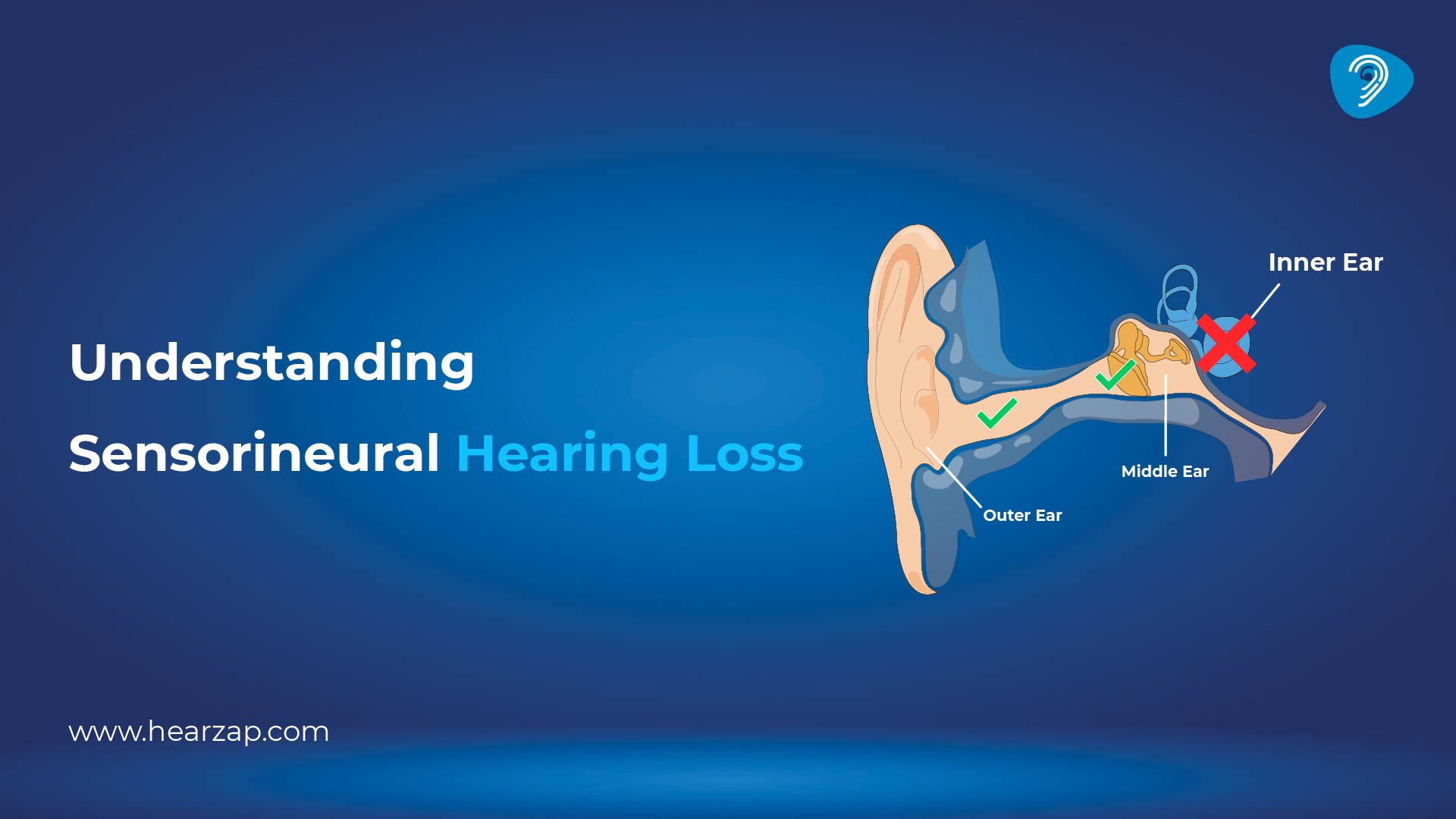
Sensorineural Hearing Loss: Symptoms, Causes & Treatment
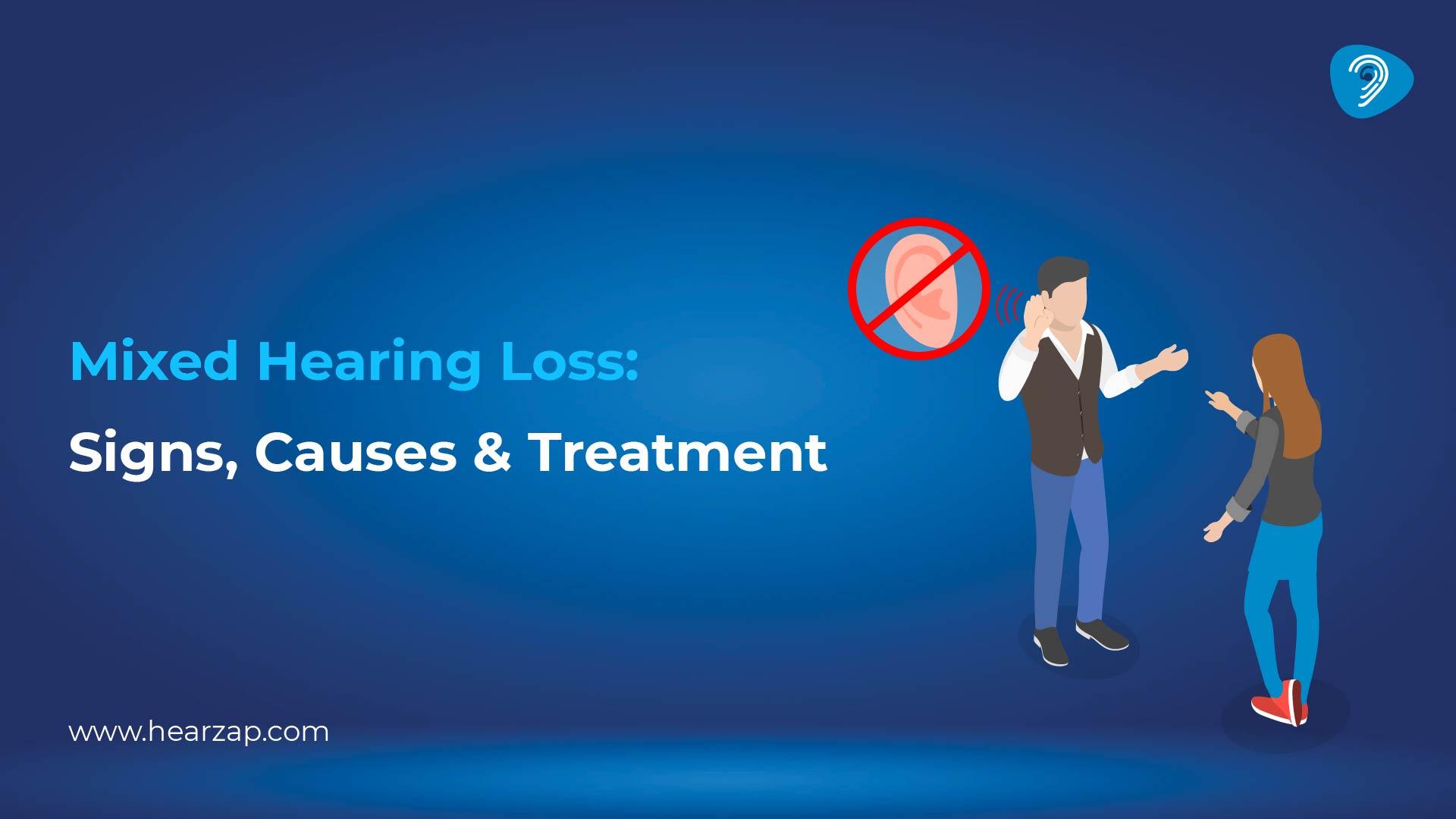
Mixed Hearing Loss: Signs, Causes & Treatment
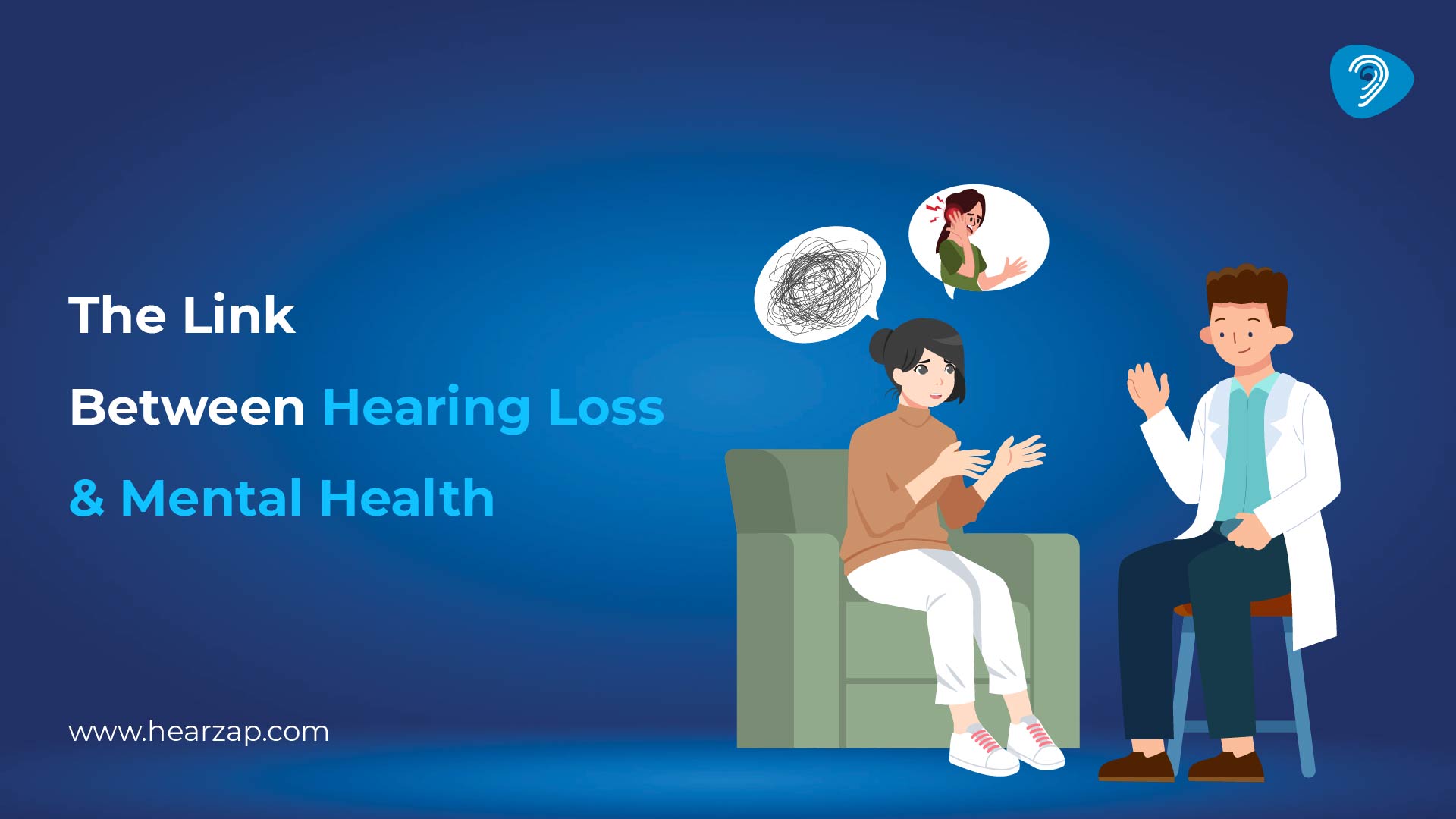
The Link Between Hearing Loss and Mental Health

Hobbies Perfect for People with Hearing Loss
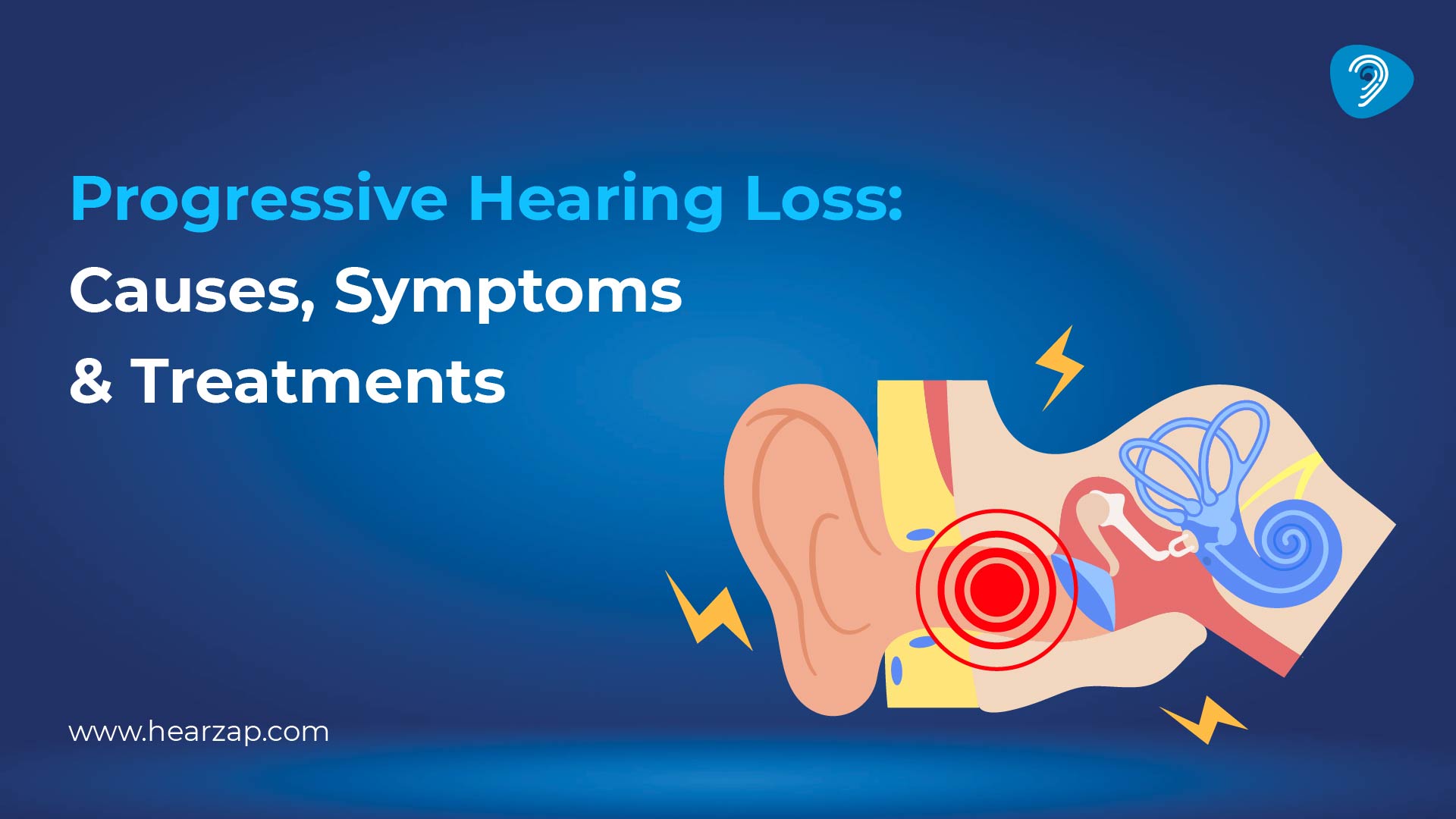
Understanding Progressive Hearing Loss: Causes, Symptoms & Treatment Options

Link Between Diabetes and Hearing Loss
Contact us
We are here for all your hearing needs, from hearing tests to hearing aids. Fill out the form below, and we will give you a call soon.
Please enter a valid mobile number with 10 digits.
Recent Blogs
By None | Dec. 26, 2025
By None | Dec. 23, 2025
By None | Dec. 22, 2025
By None | Dec. 20, 2025
By None | Dec. 19, 2025









